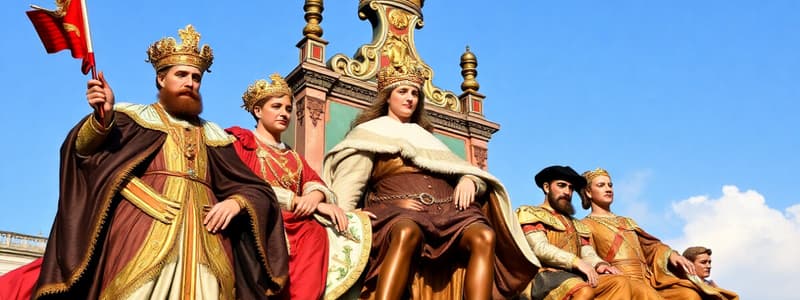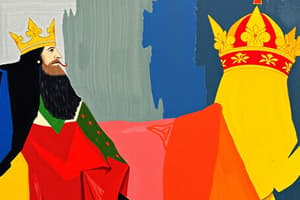Podcast
Questions and Answers
What characterizes an absolute monarchy?
What characterizes an absolute monarchy?
- Citizens have the right to revolt against the monarch's decisions.
- Power is shared between the monarch and elected representatives.
- It requires a social contract to govern effectively.
- The monarch holds complete power without constitutional limitations. (correct)
Which of the following philosophers is known for the concept of the social contract?
Which of the following philosophers is known for the concept of the social contract?
- Adam Smith
- Montesquieu
- Thomas Hobbes (correct)
- John Locke (correct)
What was a significant result of the Glorious Revolution in England?
What was a significant result of the Glorious Revolution in England?
- The enforcement of divine right of kings.
- The abolition of the monarchy entirely.
- The establishment of a constitutional monarchy. (correct)
- The rise of absolute monarchy.
Why did Russia seek a warm-water port during the rise of its power?
Why did Russia seek a warm-water port during the rise of its power?
Which of the following concepts directly influenced the foundation of the United States according to Enlightenment ideas?
Which of the following concepts directly influenced the foundation of the United States according to Enlightenment ideas?
Flashcards
Absolutism definition
Absolutism definition
A system of government where a ruler holds absolute power, without limitations from other institutions.
Glorious Revolution cause
Glorious Revolution cause
A revolution in England in 1688 where Parliament removed King James II and gave the crown to William and Mary.
Enlightenment definition
Enlightenment definition
A philosophical movement in the 18th century that emphasized reason, individual rights, and the scientific method.
Divine Right description
Divine Right description
Signup and view all the flashcards
Taxation without representation definition
Taxation without representation definition
Signup and view all the flashcards
Study Notes
Lesson 1: Absolutism
- Absolutism is a form of government where a ruler holds absolute power.
- Key figures of absolutism include Louis XIV ("The Sun King"), Peter the Great, and Catherine the Great.
- Absolutism's central principle is that the monarch's authority derives from divine right, the belief that their power comes directly from God.
- The Spanish Armada was a significant naval event reflecting the power, and later decline, of Spain.
- The Habsburg Empire held influence during this period.
- Versailles was a symbol of French absolutism, extravagance, and power.
- Autocracy, where supreme power is concentrated in one person, was a characteristic of absolutist systems of control
- Reasons for Spain's decline aren't explicitly stated, but the Spanish Armada played a significant role.
- France declined through various factors, not mentioned here.
- The Thirty Years' War profoundly impacted European politics, shifting alliances and power dynamics.
- Russia's rise to power was influenced by leaders like Peter the Great and Catherine the Great.
- Russia sought a warm-water port to facilitate trade and access to new maritime routes.
Lesson 2: Enlightenment
- The Enlightenment was a philosophical movement emphasizing reason and individual rights.
- The Scientific Revolution laid the groundwork for the Enlightenment by emphasizing observation and reason.
- Enlightenment thinkers like John Locke, Jean-Jacques Rousseau, and Montesquieu advocated for natural rights and limitations on government power.
- The Social Contract theory, as presented by Enlightenment thinkers, posits that government's legitimacy stems from the consent of the governed.
- Capitalism and laissez-faire economics, emphasized self-regulation in markets and the individual’s role in economic development, were greatly influenced by this time.
- Enlightened despotism is a form of absolutism that incorporates some enlightened principles.
- Montesquieu articulated the concept of separation of powers and checks and balances in government.
- The influence of the printing press spread enlightened ideas rapidly among the public.
- Enlightenment tenets emphasized individual liberties, reason, and natural rights, influencing modern civic thought.
Lesson 3: England & The American Revolution
- The Glorious Revolution saw the overthrow of James II, leading to a shift towards a constitutional monarchy.
- England wasn't fully absolutist because of the development of a powerful Parliament and limitations on the monarch's power.
- The English Bill of Rights established certain rights for English citizens.
- The English Bill of Rights, influenced by the Magna Carta, greatly influenced the American founding documents.
- The American colonists, protesting "taxation without representation," sought independence from Britain.
- The Declaration of Independence, an assertion of popular sovereignty, inspired by Enlightenment ideals, was a catalyst for the American Revolution.
- The Treaty of Paris formally ended the American Revolutionary War and recognized American independence.
- The American Revolution was profoundly shaped by Enlightenment ideals, inspiring leaders to form new ideas based on these ideals.
- The Battle of Yorktown was a decisive victory for the American colonists.
Lesson 4: Causes of the French Revolution (Incomplete)
- This section is currently under development.
Studying That Suits You
Use AI to generate personalized quizzes and flashcards to suit your learning preferences.



